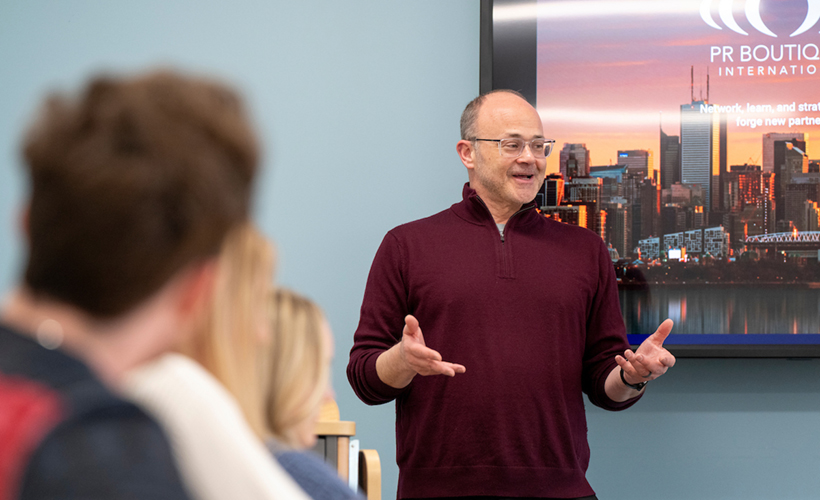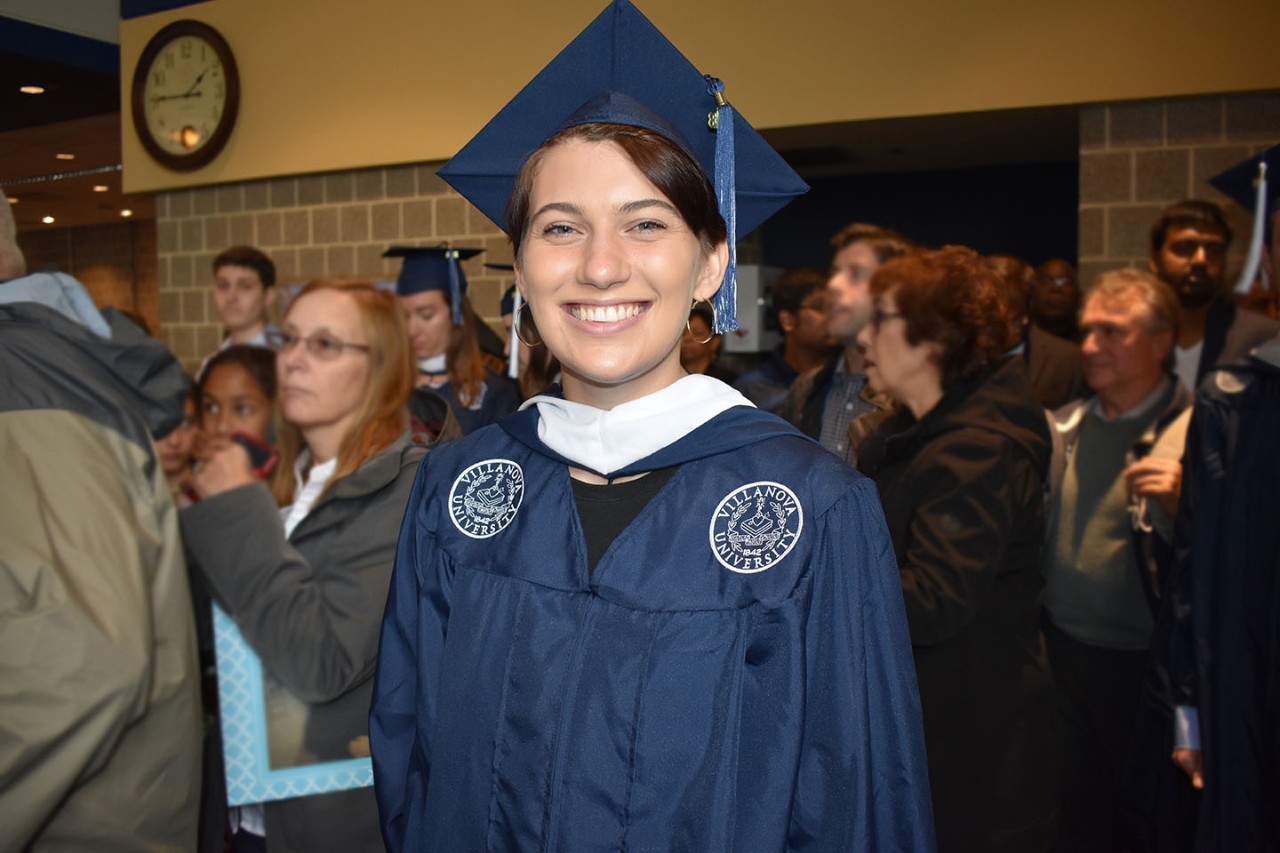MA IN COMMUNICATION

The Master of Arts degree requires successful completion of 33 credit hours of graduate coursework in which students explore the principles, practices and contexts relevant to the study of communication.
As an option, and with program approval, students may substitute up to two graduate courses (up to six credits) from outside of Graduate Studies in Communication that complement program offerings.
Degree requirements include a mix of Core and Focal courses, as well as a Capstone experience. In addition, no more than two independent study courses (up to six credits) will be counted toward M.A. degree requirements, and no more than three one-credit courses will be counted toward MA degree requirements including the required one-credit Orientation.
DEGREE REQUIREMENTS
Communication theory and research are the foundation of graduate study in the department.
After being oriented to graduate study within the program, students are required to engage coursework in strategic communication theory and at least one of the two required courses in methodology, qualitative or quantitative research methods in communication, prior to engaging any other coursework in the program.
- COM 8008 – Orientation to Graduate Study (1 credit)
- COM 8100 – The Communication Perspective (3 credit)
- COM 8001 – Qualitative Research Methods (3 credit)
- COM 8002 – Quantitative Research Methods (3 credit)
Note: COM 8008, COM 8100 and either COM 8001 or COM 8002 must be completed prior to or concurrent with any other course.
Elective Courses
Upon completion of foundational coursework in the program, students engage focal courses in the discipline. As a discipline, communication focuses on the study and the practice of principled message negotiation within varied contexts. To ensure adequate exposure to these dimensions of communication, students complete two courses within each of the following focal areas: Principles, Practices and Contexts.
Principles Courses
Principles courses focus on the overarching philosophical, ethical and methodological issues relevant to the study and practice of communication in multiple contexts.
- COM 8004 - Communication Directed Study
- COM 8005 - Communication Special Topics
- COM 8200 - Teambuilding & Small Group
- COM 8207 - Organizational Communication
- COM 8210 - Leadership Communication
- COM 8211 - Communication & Identity
- COM 8212 - Communication & Advocacy
- COM 8301 - Strategic Public Relations
- COM 8304 - Journalism
- COM 8307 - Visual Communication & Culture
- COM 8308 – Theories & Effects of Mass Com
- COM 8309 - Public Opinion
- COM 8310 - New Media
Practices Courses
Practices courses focus on the strategic application of communication principles to the creation of messages within particular contexts.
- COM 8004 - Communication Directed Study
- COM 8005 - Communication Special Topics
- COM 8102 - Persuasion & Advocacy
- COM 8203 – Org. Research & Consulting
- COM 8206 – Diversity & Organizing
- COM 8208 - Public Communication Campaigns
- COM 8300 - Public Relations Writing
- COM 8302 - Advertising
- COM 8306 - Media Production
- COM 8320 - Digital Media Design
- COM 8009 - Personal Promotion*
- COM 8010 – Becoming an Academic*
- COM 8011 - Health Promotion Messages*
- COM 8314 - Photoshop*
- COM 8315 - Video Shooting Lab*
- COM 8316 - Audio Production*
- COM 8317 - Basic Web Design*
- COM 8318 - Developing Crisis Communication Materials*
- COM 8401 - Special Topics in Qualitative Research*
- COM 8402 - Special Topics in Quantitative Research*
- COM 8403 - Special Topics in Applied Organizational Communication*
* One-credit seminar. May take two 1-credit courses along with Orientation (COM 8008) instead of a 3-credit elective course to fulfill degree requirements
Contexts Courses
Contexts courses focus on the places, spaces, situations, and modalities within which principled communication has significant impact.
- COM 8003 - Internship in Communication
- COM 8004 - Communication Directed Study
- COM 8005 - Communication Special Topics
- COM 8101 - Performance Studies
- COM 8201 - Health Communication
- COM 8204 - Conflict & Negotiation
- COM 8205 - Intercultural Communication
- COM 8209 - International Public Relations
- COM 8303 - Mass Media Industries
- COM 8305 - Media Literacy
- COM 8319 - Cultural Studies
- COM 8321 - Critical Studies in Advertising
To culminate studies toward the MA in Communication degree, students must complete a capstone experience by successfully completing either a comprehensive examination plus 5-6 additional elective course credits (students may opt to take two 1-credit courses along with Orientation (COM 8008) instead of a 3-credit elective course under the advisement of their graduate faculty mentor) or a written six-credit master’s thesis.
Capstone Requirement Options
Non-thesis Option
Students not pursuing a Thesis Capstone may apply to take a two-part comprehensive written exam with the approval of the Graduate Program Director.
After completing a minimum of 21 credits, students may apply to complete a written take-home comprehensive examination. The examination includes questions from two areas: Research Methods (either COM 8001 Qualitative Research Methods or COM 8002 Quantitative Research Methods) and an elective course in the student’s area of specialization. Students must have successfully completed a course to take a comprehensive examination for that course. Students may be invited to orally defend their written responses in order to demonstrate sufficient competency.
Thesis Option
Students may apply for permission from the program to submit a written thesis and complete an oral defense as partial satisfaction of the capstone requirement.
Work on the thesis will earn the equivalent of two courses (6 credits) toward the degree and also substitutes for the written portion of the comprehensive examination.
The thesis project will be designed and completed under the supervision of an advisor, who must be graduate faculty in communication, and who is assisted by a committee of at least two other faculty members or professional consultants, one of whom must be from Communication.
Students must have completed all required courses and a total of 21 credits and have formed a thesis committee approved by the program prior to registering for thesis credits.
Upon admission into one of our graduate programs, students are assigned to our Graduate Program Director for advisement. The director will be able to answer questions about the curriculum, degree requirements, and scheduling.
After students have been in the program for two semesters, students (in consultation with the Graduate Program Director) may choose a new academic advisor from our list of graduate faculty. That faculty member will then serve as the academic advisor for the remainder of the student's progress toward graduation. (Students choosing the thesis capstone option will also choose a thesis advisor, but note that this person does not have to be the same as the student's academic advisor.)
Your First Classes in Communication
For students beginning their graduate coursework in the Fall semester, their first classes in the program will be COM 8008 - Orientation to Grad Study and COM 8100 - The Communication Perspective. Students taking more than one course during the Fall will also take COM 8001 - Qualitative Research Methods OR COM 8002 - Quantitative Research Methods as part of their course load. Students taking three courses during that semester will choose a third course from the semester offerings.
For students beginning their graduate coursework in the Spring semester. their first classes in the program will be COM 8008-Orientation to Graduate Study and COM 8001 – Qualitative Research Methods OR COM 8002 – Quantitative Research Methods. Students taking more than one course during the Spring will choose additional courses from the semester offerings. Students beginning in the Spring will be required to take COM 8100 - The Communication Perspective in their second semester in the program, or prior to taking any additional advanced coursework.
MA and certificate students accepted for starting in the Fall semester CANNOT take summer classes during the summer prior to their fall start date (with the exception of COM 8008 - Orientation to Grad Study, a course which is required of all those beginning the degree).
ALUMNI SPOTLIGHT - KEVIN LESSARD ’12 MA

“My time at Villanova was one of the formative experiences of my career. From the beginning, the program challenged my research, writing and critical thinking abilities—a process that was helpful not only professionally, but also personally. The coursework also challenged my assumptions about the world and opened doors I didn't know existed, both in my career and in my mind. The program's focus on the application of research and communication theory into practice in everyday life is an invaluable benefit that I'll carry with me for the rest of my career."
- Kevin Lessard '12 MA, Director of Communications, Office of the Mayor, City of Philadelphia

